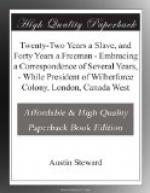A most beautiful ode was composed by a warm and generous friend of the cause, which was sung in the grove, in a spirit which produced a thrilling interest. Gladly would I give the reader the whole composition, but its length makes it objectionable for this place, but should they happen to hear a soul-stirring and sublime ode, commencing with,
“Hail! to this day returning;
Let all to Heaven aspire,” &c.,
they may know it is the one to which I refer.
It was indeed, a glorious day for the colored population generally; and many were the indications of a diminution of that prejudice so prevalent everywhere. Some, who had supposed the colored man so inferior to themselves as to be incapable of making an interesting speech, were convinced of their error, after hearing Messrs. Douglass, Ward and Garnet. Mr. Van Loon was a white clergyman, but a brother indeed; his soul illumined by the pure light of the gospel of peace; his heart full of sympathy for the oppressed; his tongue pleading eloquently for equal rights; and his hands busily engaged in breaking every yoke, resting on the necks of poor humanity. So vigorously, so zealously did he unfold the horrors of the slave system; so truthfully and faithfully did he expose the treachery of northern politicians, and so pathetically did he appeal to the humanity of every professed Christian to speak out boldly for the dumb; to shield, by the holy principles of their religion, the poor, bound, illiterate slave, from Southern cruelty and bondage,—that some of our aristocratic citizens, some of our white savans, repaid his truthful eloquence, by visiting upon him the bitterest maledictions. From the negro, said they, we will accept these statements as true,—from him, they are pertinent and forcible; but when such unpalatable truths are uttered by a white clergyman, we cannot abide, nor will we listen to them!
Let consistency blush, and justice hang down its head! Is not truth the same, whether proclaimed by black or white,—bond or free? Is a falsehood to be pardoned because uttered by a negro? If indeed, as was admitted, the sentiments expressed by our eloquent colored speakers, were true, could they be false, when enforced by our intellectual friend, Van Loon? Certainly not; nor would the case have been so decided by these Solons, in any other case: or where the prejudice against color had not warped and blinded their otherwise good judgments. Our speaker, however, performed his duty faithfully, and with great satisfaction to the colored people and their true friends present.
The remains of this fearless champion of liberty; this humble disciple of the despised Nazarene, now sleeps in death, beside the placid waters of the Hudson, while his cherished memory lives in the affections of thousands, who “are ready to perish,” and is honored by the pure in heart, wherever his name has been known throughout the land. In the day of final reckoning, think you, he will regret




